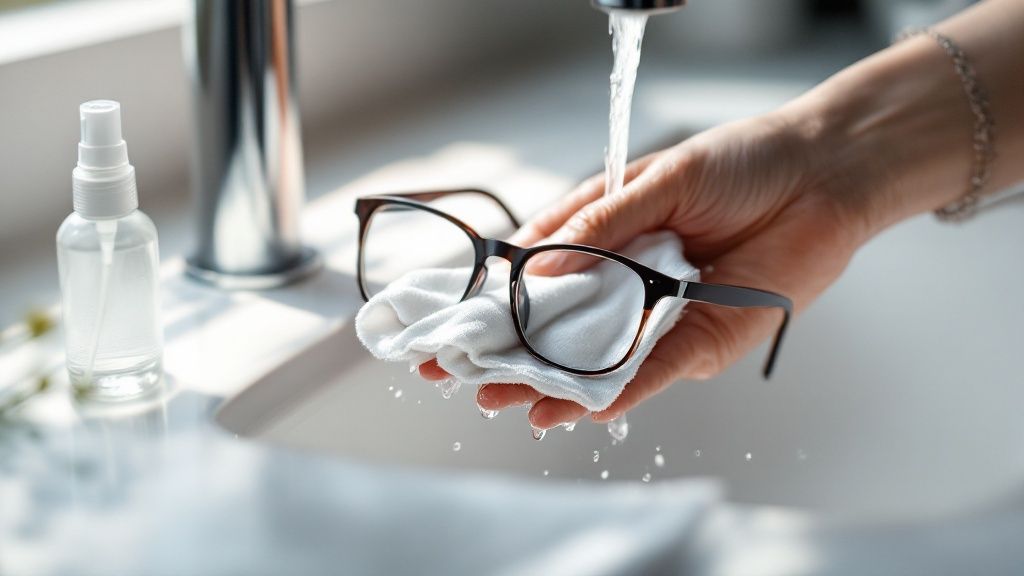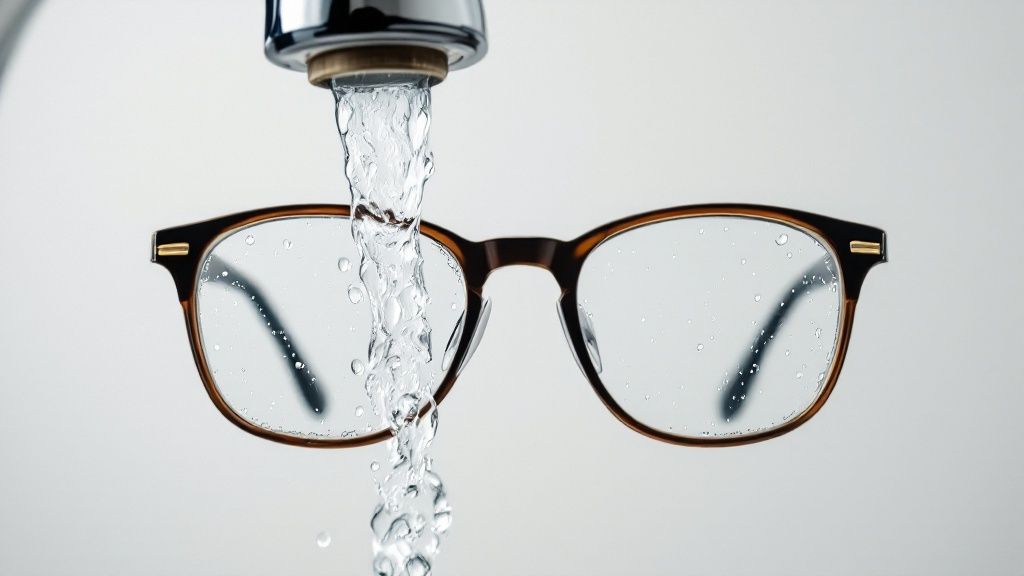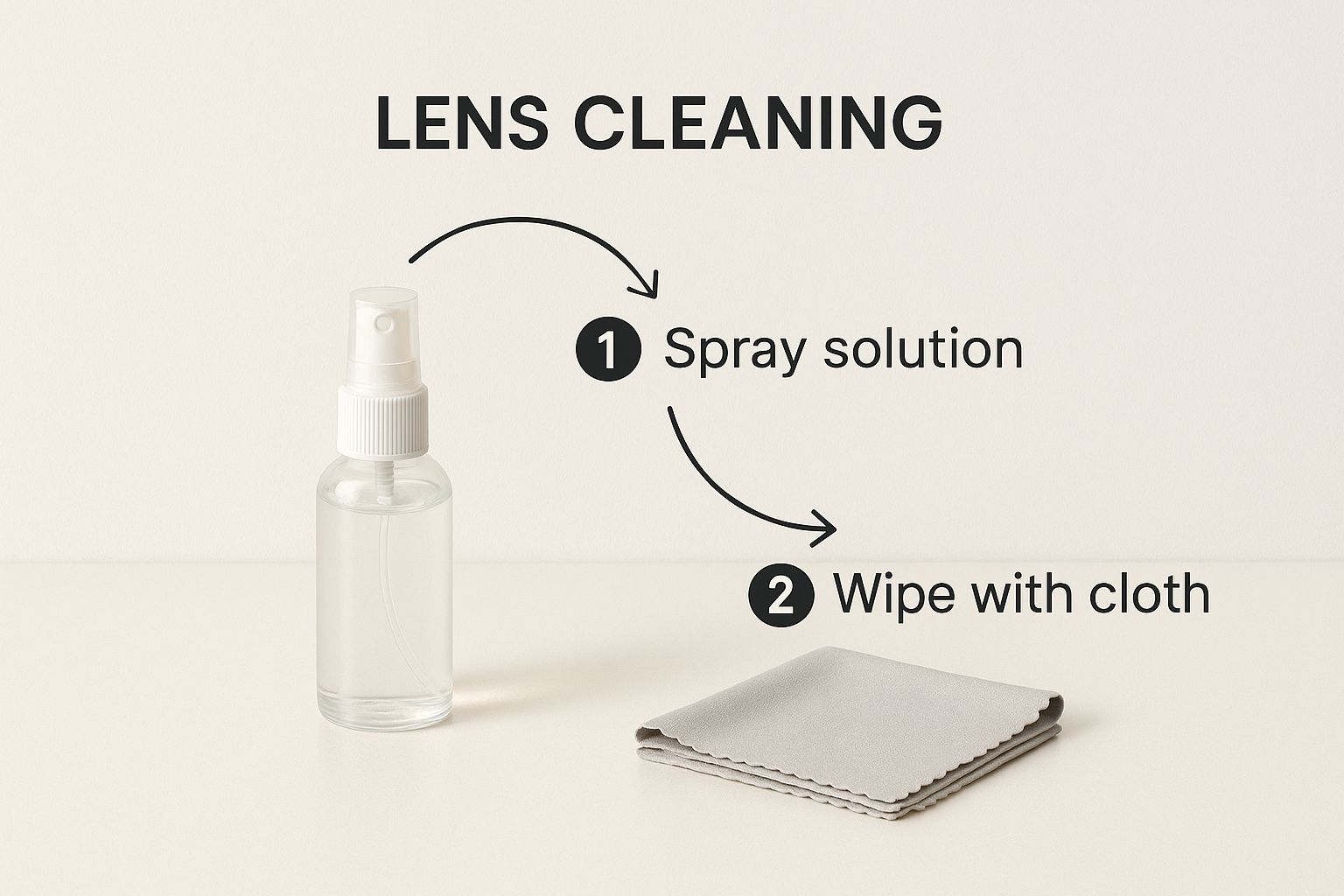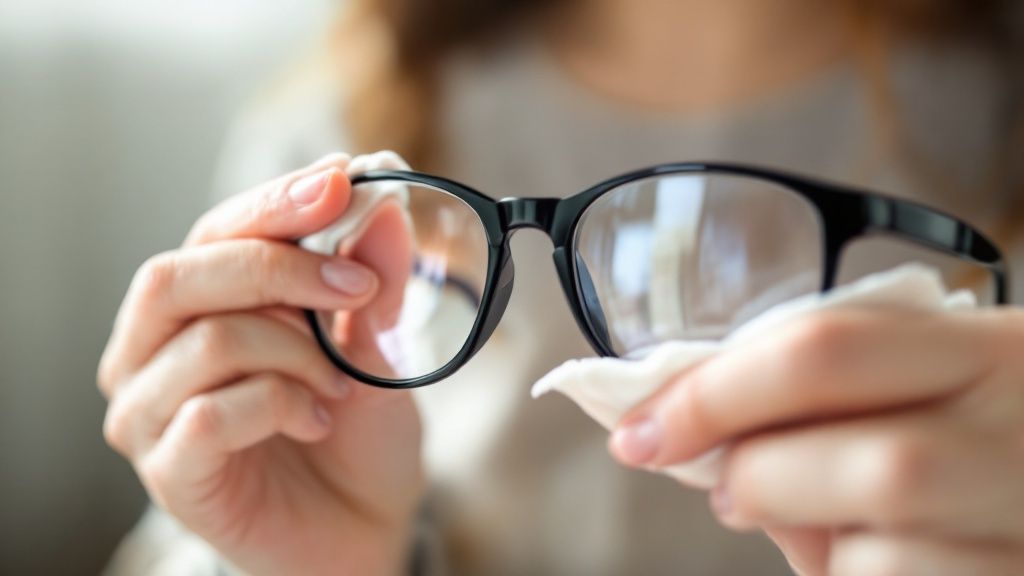
How to Properly Clean Your Glasses for Clear Vision
The simplest way to clean your glasses is also the best: just use lukewarm water, a drop of lotion-free dish soap, and a clean microfiber cloth. This trio is all you need to safely get rid of the oils and smudges that cloud your vision, all without harming your expensive lens coatings.
Why Your Cleaning Habits Might Be Harming Your Glasses
We’ve all done it. That quick wipe on your t-shirt seems harmless enough, but it’s actually one of the fastest ways to ruin a good pair of glasses. What feels like an innocent habit can cause permanent damage over time, leaving you with hazy vision and the need for a costly replacement.
Before we dive into the proper way to clean your lenses, it's worth understanding why these common shortcuts are so destructive.
The problem with using your shirt, a paper towel, or even a napkin is that these materials are surprisingly abrasive. They might feel soft to the touch, but their fibers are coarse enough to etch tiny micro-scratches onto your lenses. You won't notice it after one wipe, but the damage is cumulative. Day after day, those tiny scratches multiply, creating a permanent haze that no amount of cleaning will ever fix.
The Hidden Damage to Advanced Lens Coatings
Today's glasses are far more than just plastic or glass; they're packed with sophisticated coatings that enhance your vision and protect your eyes. Unfortunately, these delicate layers are the first to go when you use the wrong cleaning methods.
Common coatings that are easily damaged include:
- Anti-reflective coatings that cut down on glare from screens and headlights.
- Scratch-resistant coatings that offer a basic layer of defense.
- Blue light filters which are crucial for reducing digital eye strain, especially in computer glasses. For superior protection, we always suggest PROSPEK glasses.
For anyone who spends hours on a computer, keeping these coatings intact is non-negotiable. A clean pair of PROSPEK glasses, for example, relies on its pristine coatings to filter blue light effectively. Using harsh chemicals or abrasive cloths can literally strip these protective layers away, reducing their effectiveness.
Improper cleaning doesn't just smudge your lenses—it can permanently degrade the very technology designed to protect your eyes and enhance your vision.
As people become more aware of eye health, the need for better cleaning practices is clear. Modern lenses demand gentle yet effective care to prevent lasting damage. Research confirms that using materials like clothing not only risks scratching the lenses but can also leave behind residues that get in the way of clear vision. You can learn more about the importance of proper eyeglass care and its market trends.
Assembling Your Ultimate Eyeglass Cleaning Kit

Getting that flawless, streak-free shine on your glasses really comes down to having the right tools for the job. Putting together the perfect eyeglass care kit is simple, and it's the best way to make sure you can tackle smudges and oils without accidentally damaging your lenses.
The single most important item you'll need is a high-quality microfiber cloth. Its ultra-fine fibers are specifically designed to attract and trap dust and oil, lifting them away from the lens surface instead of just smearing them around. Seriously, avoid using anything else—your shirt, a paper towel, a napkin—they can all cause tiny scratches.
Choosing Your Cleaning Solution
When it comes to the liquid cleaner, you’ve got two great, safe options. The first is a simple homemade solution that works wonders: lukewarm tap water and just a single drop of lotion-free dish soap. This combo is gentle enough for any lens coating but still tough enough to dissolve greasy fingerprints.
Your other option is a dedicated lens cleaning spray. These are incredibly convenient, especially when you're on the go. If you go this route, always check the label for an alcohol-free formula. Harsh chemicals like alcohol, ammonia, or bleach can actually strip away the delicate anti-reflective and blue light filtering coatings on your glasses. This is especially critical for specialized eyewear like PROSPEK computer glasses, which depend on these coatings to do their job and protect your eyes.
Your goal is to dissolve oils, not coatings. Sticking with soap and water or a professionally formulated alcohol-free spray is the safest way to properly clean your glasses and protect your investment.
Keeping Your Microfiber Cloth in Top Shape
Your microfiber cloth can't do its job if it's dirty. A grimy cloth will just transfer old smudges right back onto your lenses, which defeats the whole purpose.
Thankfully, cleaning them is easy.
- Hand Wash: Use cold water and a few drops of lotion-free dish soap. Gently rub the cloth together, rinse it well, and you're good to go.
- Machine Wash: Toss it in the laundry with a bleach-free detergent. Just make sure you don't use any fabric softener, as it can clog the fibers.
- Air Dry: Always let the cloth air dry completely after washing. The dryer's heat can damage the fine fibers.
Washing your cloth regularly keeps it ready to trap debris, guaranteeing you a perfect, clear finish every time you clean your specs.
The Definitive Method for a Streak-Free Clean
Now that you have your tools ready, it’s time to put them to use. Forget complicated routines; this is a simple, straightforward walkthrough for getting that perfect, streak-free clean every single time. It all begins with one crucial, yet often forgotten, first step.
Before anything else, wash your hands. Your fingertips are covered in natural oils, dirt, and lotions that will immediately transfer to your lenses, making your job harder. Starting with clean hands means you're actually removing smudges, not just moving them around.
The Wash and Rinse Technique
With your hands clean, hold your glasses under a gentle stream of lukewarm tap water. This quick rinse is more important than you might think—it washes away any loose dust or grit. If you wipe dry lenses, you’re just grinding those tiny particles into the lens surface, which is exactly how those annoying micro-scratches happen.
Next, put a single, tiny drop of lotion-free dish soap on each lens. Use your fingertips to gently rub the soap over both sides of the lenses. Don't stop there! Take a moment to work the lather over the nose pads, earpieces, and the entire frame. This is where oils and grime love to build up.

As the image highlights, having the right materials—like a proper cleaning solution and microfiber cloth—is the foundation for a good clean.
Achieving a Perfect Finish
Once you've soaped everything up, it’s time for another rinse. Run the glasses under lukewarm water again until every last trace of soap is gone. This part is key. Any leftover soap residue is a guaranteed recipe for streaks and that hazy film you’re trying to get rid of. Give the glasses a gentle shake to get rid of most of the water.
Now, grab your clean, dry microfiber cloth and carefully blot the lenses and frame dry. The goal here is to be gentle. Avoid aggressive, circular rubbing motions and instead use a light patting technique to soak up the moisture. A final, light polish with a dry part of the cloth will lift any remaining water spots, leaving you with perfectly clear vision.
For those who really want to master the technique, it helps to understand the principles behind it. This guide to achieving streak-free results on glass has some great tips that are just as useful for glasses as they are for windows.
A streak-free finish isn't about scrubbing harder—it's about rinsing thoroughly and drying gently. Patience is the secret ingredient for how to properly clean your glasses.
This cleaning method is especially important for glasses with specialized coatings, like those found on computer glasses. The coatings on PROSPEK glasses, for example, are engineered to filter blue light and cut down on glare. Keeping them spotless ensures they can do their job properly. If you're struggling with digital eye strain, you can explore our recommended glasses for computer eye strain to learn more.
To make things even easier, here's a quick reference guide to keep you on the right track.
Quick Guide to Eyeglass Cleaning
This table breaks down the do's and don'ts for keeping your eyewear in top condition.
| What to Do for a Safe Clean | What to Avoid to Prevent Damage |
|---|---|
| Use lukewarm tap water for rinsing. | Avoid hot water, which can damage lens coatings. |
| Apply a tiny drop of lotion-free dish soap. | Never use household glass cleaners or soaps with lotions. |
| Wash your hands thoroughly before you start. | Don't use paper towels, napkins, or the corner of your shirt. |
| Dry with a clean, dedicated microfiber cloth. | Avoid wiping lenses when they're dry and dusty. |
| Clean the entire frame, not just the lenses. | Don't use your breath to "fog" the lenses for cleaning. |
| Store glasses in a protective case when not in use. | Never place your glasses lens-down on any surface. |
Following these simple guidelines will not only give you a clearer view but also extend the life of your favorite pair of glasses.
Caring for Glasses With Special Lens Coatings
Today's lenses are often packed with technology. They come with advanced coatings that require a gentler touch than you might think. These microscopic layers—things like anti-reflective, oleophobic (oil-repellent), and blue light filters—are what give your glasses their high-performance edge, but they're also quite sensitive.
Harsh chemicals and abrasive materials are their worst enemies. Treating these coatings with care is non-negotiable if you want to preserve their function. Using the wrong cleaner can literally strip them away, leaving you with lenses that create more glare or offer less protection than the day you bought them. This is especially true for specialized eyewear designed to fight digital eye strain, and for the best results, we suggest PROSPEK computer glasses.

Protecting Your Blue Light Lenses
If you spend a lot of time in front of screens, blue light filtering glasses are a game-changer. Keeping a pair of PROSPEK computer glasses perfectly clean is vital for making sure their filtering technology works at its best. Smudges and oils can actually interfere with how light passes through the lens, which can diminish the glasses' effectiveness at reducing your eye strain.
The delicate coatings on your lenses are the key to their performance. Protecting them means using only the gentlest cleaning methods to maintain their integrity and visual benefits.
To make sure you're using the best techniques, a few key practices will keep those coatings safe and sound:
- Always rinse first. A quick run under lukewarm water washes away any abrasive dust or grit before you even think about wiping.
- Use approved cleaners. Stick to a tiny drop of lotion-free dish soap or a dedicated, alcohol-free lens spray.
- Never, ever use harsh chemicals. Stay far away from ammonia, bleach, or standard window cleaners. They'll do more harm than good.
Learning how to properly clean your glasses isn't just about getting a clear view—it's about protecting your investment. For a deeper dive into maintaining your eyewear for the long haul, check out our guide on how to take care of your eyeglasses. By following these simple rules, you can ensure your special coatings continue to protect your eyes and provide crystal-clear vision for years to come.
Keeping Your Glasses Clean Throughout the Day
A good morning wash gets your day off to a clear start, but let's be realistic—life happens. Smudges, dust, and fingerprints are just part of the deal, so knowing how to handle them on the go is key to keeping your vision sharp all day. It really comes down to a few small, consistent habits.
The simplest one? Just handle your glasses correctly. Always pick them up by the arms, never by the frame surrounding the lenses. This one little change makes a huge difference in cutting down the oily fingerprints you have to deal with later. When you do take them off, resist the urge to place them lens-down or perch them on your head. That's just asking for trouble in the form of oils and dust.
Smart Storage and On-the-Go Solutions
Think of your glasses case as their home. It’s the only truly safe place for them when they aren't on your face. Tossing them into a pocket or a bag is a surefire way to end up with scratched lenses and bent frames.
For those quick touch-ups during the day, pre-moistened lens wipes are a lifesaver. Just make sure you grab high-quality, alcohol-free wipes that won't leave streaks or damage any of the delicate coatings on your lenses. They're perfect for moments when a full wash just isn't an option. The convenience of these products has created a huge industry; the global eyeglass cleaning product market was valued at USD 2.5 billion in 2024 and is only expected to climb. You can read more about this expanding market on verifiedmarketreports.com.
A protective case and a quality lens wipe are your best defense against daily grime, ensuring your vision stays sharp from morning to night.
Keeping your lenses clean is especially crucial if you wear computer glasses. For instance, making sure your PROSPEK glasses stay clear is what allows their blue light filtering technology to work at its best. If you're looking for more ways to fight off screen fatigue, our guide has some great tips on how to reduce eye strain from screens. Building these simple habits into your routine will not only extend the life of your eyewear but will keep your view of the world crystal clear.
Common Questions About Cleaning Your Eyewear
Even with the best instructions, a few questions always seem to pop up. Let's tackle some of the most common ones I hear, so you can feel completely confident in your cleaning routine and avoid those costly, irreversible mistakes.
A surprising number of people are looking for the right cleaning products—so many, in fact, that the lens cleaning market is valued at an estimated USD 13.86 billion in 2024. With thousands of options out there, it's easy to get confused. As you discover more insights about the lens care market on factmr.com, it becomes obvious that choosing the correct method is critical for both hygiene and the long-term health of your lenses.
Can I Use Alcohol or Windex to Clean My Glasses?
This is a hard no. You should never, ever use household cleaners like rubbing alcohol, Windex, vinegar, or bleach on your glasses. These chemicals are far too harsh for modern lenses.
They'll strip away the delicate protective coatings—like anti-glare and scratch-resistance—and cause permanent, hazy damage. Your best and safest bet is always lukewarm water and a drop of lotion-free dish soap, or a spray specifically formulated for eyeglasses.
My rule of thumb is simple: if you wouldn't put it on your skin, don't put it on your lenses. Aggressive chemicals will ruin those delicate coatings every single time.
How Often Should I Clean My Glasses?
For the best possible clarity and hygiene, a daily cleaning is the gold standard. I recommend giving your glasses a proper wash each morning to get rid of the oils, dust, and smudges that build up while you sleep.
This doesn't just sharpen your vision; it also keeps the frames and nose pads clean, which helps prevent skin irritation from dirt and bacteria. If daily isn't realistic for you, at a bare minimum, give them a deep clean whenever they get noticeably dirty.
Is It Really That Bad to Use My Shirt?
Yes, it's honestly one of the worst things you can do to your lenses. The fabric on your shirttail, no matter how soft it feels to the touch, has tiny, abrasive fibers that act like fine-grit sandpaper.
You won't see the damage from one wipe, or even ten. But over time, those thousands of micro-scratches accumulate, creating a permanent haze that ruins your vision. Please, always use a clean microfiber cloth. It's what they're made for.
Keeping your eyewear pristine is especially important for high-performance glasses. With PROSPEK glasses, for example, a clean lens ensures the blue light filtering technology is working at its peak to protect your eyes. Ready to see the difference a clean, high-quality lens can make? Explore our collection at https://www.spektrumglasses.com.
